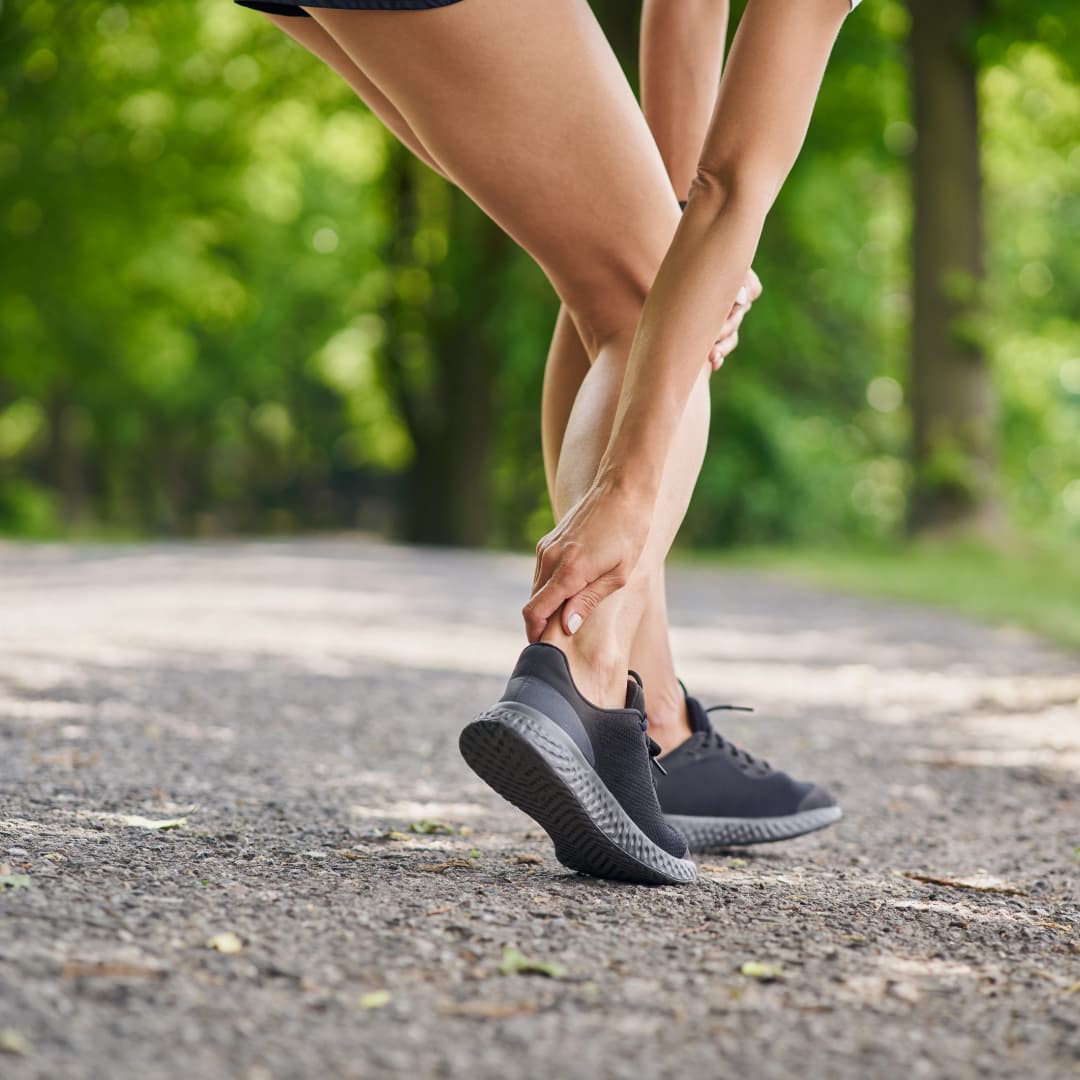Achilles Tendinopathy Symptoms & Treatment
What is Achilles Tendinopathy?

Table of Contents
What Causes Achilles Tendinopathy?
Each time you walk, run, or point your foot downward, your calf muscle is engaged, placing stress on the Achilles tendon. When this stress surpasses what the tendon can handle due to factors like strength, fitness, and flexibility it can lead to changes in the tendon, resulting in pain, inflammation, or degeneration.
These changes can vary from small micro-tears to partial or even complete tendon ruptures. Activities that can overload the tendon and increase stress include:
- Running, especially at high speeds or over long distances
- Intense physical activity or gym training
- Repeated strain on the tendon over time
- Tight calf muscles, which put added pressure on the tendon
- Wearing unsupportive footwear, particularly with low heels
- Poor foot biomechanics that place uneven stress on the tendon
What Are The Symptoms Of Achilles Tendinopathy?
If you’re experiencing pain and swelling in the Achilles tendon at the back of your heel, it’s likely that the tendon has been damaged. However, similar symptoms can be caused by other conditions, so it’s important to see a healthcare professional for a thorough assessment.
The terminology surrounding Achilles tendon issues can be unclear:
Tendonitis refers to inflammation in the tendon, which can cause pain and stiffness. This is commonly seen in the early stages of an Achilles injury or during flare-ups of an existing injury.
Tendinosis involves micro-changes in the tendon without significant inflammation. Achilles injuries may begin with inflammation (tendonitis), but as the swelling reduces, the injury often transitions into a more degenerative state without inflammation.
No matter what stage you’re experiencing, your podiatrist will use evidence-based treatment methods to support your recovery.
Visit Us Today
Hope Island
Phone: 07 5510 9222
Located within Hope Island Marketplace Medical & Skin Clinic, 99-103 Broadwater Ave Hope Island QLD 4212
Jimboomba
Phone: 07 5546 9766
Located Within Jimboomba Medical Centre, Unit 1/69 Cerina Cct, Jimboomba QLD 4280
Beenleigh
Phone: 07 3287 2224
Located Within Beenleigh Mall Medical Centre, Shop24A, 40/68 Main Street, Beenleigh QLD 4207
Eagleby
Phone: 07 2889 1666
Located Within Eagleby Family Practice, 5/120 River Hills Rd, Eagleby QLD 4207
Harristown
Phone: 07 4635 6111
Located Within Toowoomba Medical Centre, 146 Drayton Road, Harristown QLD 4350
Marsden
Phone: 07 3067 2370
Located Within Marsden Family Doctors, Shop 28/55-77 Chambers Flat Rd, Marsden QLD 4132
Keperra
Phone: 07 3355 4082
Located Within Keperra Medical Clinic, 14 Dallas Parade Keperra QLD 4054
Coomera
Phone: 07 5573 5663
Located Within Doctors @ Coomera Central, Shop 6, 21 Coomera Grand Drive, Upper Coomera, QLD 4209
Newtown
Phone: 07 4633 8700
Located Within Ochre Medical Centre Wyalla, Shop 20, 238 Taylor Street, Newtown QLD 4350
How To Treat Achilles Tendinopathy
Since various factors can contribute to Achilles tendon strain—such as age, foot biomechanics, footwear, muscle tightness, and strength—we begin by evaluating the biomechanical function of your feet and legs. This allows us to not only address your current symptoms but also reduce the likelihood of future issues.
After a comprehensive assessment, we will work with you to develop a tailored treatment plan that aligns with your specific needs and goals. Based on the latest research, your plan will likely include targeted exercises to enhance the tendon’s ability to handle load. Additional treatment options may include:
- Strapping
- Footwear modifications
- Custom foot orthotics prescribed by your podiatrist
Achilles Tendinopathy FAQ's
What is Insertional Achilles Tendinopathy?
Can shoes cause Achilles Tendinopathy?
What does Achilles Tendinopathy?
Achilles tendinopathy causes pain, swelling, and stiffness in the back of the heel or lower calf. You might notice the area becoming swollen, thickened, or a bump forming on the heel. Pay attention if the pain gets worse after walking, running, or standing for a long time. If you notice these signs, it’s important to see your podiatrist for the right treatment.
How long does Achilles Tendonitis take to heal?
The healing time for Achilles tendinopathy depends on the severity of the injury, ranging from a minor strain to a more extensive injury or tendon tear. Recovery can take anywhere from a few weeks to several months. Your podiatrist will guide you through the best treatment plan to help you heal as quickly as possible.
Enquire Now
Not The Condition You Are Looking For?
Find out more about the conditions we treat by clicking below.
